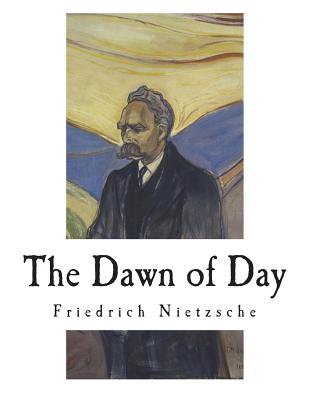The Dawn of Day: Daybreak: Thoughts on the Prejudices of Morality

The Dawn of Day: Daybreak: Thoughts on the Prejudices of Morality
The Dawn of Day by Friedrich Nietzsche and translated by John McFarland Kennedy. The Dawn of Day or Daybreak; English: The Dawn of Day/ Daybreak: Thoughts on the Prejudices of Morality) is an 1881 book by the German philosopher Friedrich Nietzsche. The Nietzsche scholar Keith Ansell-Pearson writes that Dawn is the least studied of all of Nietzsche's works. When Nietzsche called his book The Dawn of Day, he was far from giving it a merely fanciful title to attract the attention of that large section of the public which judges books by their titles rather than by their contents. The Dawn of Day represents, figuratively, the dawn of Nietzsche's own philosophy. Hitherto he had been considerably influenced in his outlook, if not in his actual thoughts, by Schopenhauer, Wagner, and perhaps also Comte. Human, all-too-Human, belongs to a period of transition. After his rupture with Bayreuth, Nietzsche is, in both parts of that work, trying to stand on his own legs, and to regain his spiritual freedom; he is feeling his way to his own philosophy. The Dawn of Day, written in 1881 under the invigorating influence of a Genoese spring, is the dawn of this new Nietzsche. "With this book I open my campaign against morality," he himself said later in his autobiography, the Ecce Homo.
61.61Lei
61.61Lei
Livrare in 2-4 saptamani
Descrierea produsului
The Dawn of Day by Friedrich Nietzsche and translated by John McFarland Kennedy. The Dawn of Day or Daybreak; English: The Dawn of Day/ Daybreak: Thoughts on the Prejudices of Morality) is an 1881 book by the German philosopher Friedrich Nietzsche. The Nietzsche scholar Keith Ansell-Pearson writes that Dawn is the least studied of all of Nietzsche's works. When Nietzsche called his book The Dawn of Day, he was far from giving it a merely fanciful title to attract the attention of that large section of the public which judges books by their titles rather than by their contents. The Dawn of Day represents, figuratively, the dawn of Nietzsche's own philosophy. Hitherto he had been considerably influenced in his outlook, if not in his actual thoughts, by Schopenhauer, Wagner, and perhaps also Comte. Human, all-too-Human, belongs to a period of transition. After his rupture with Bayreuth, Nietzsche is, in both parts of that work, trying to stand on his own legs, and to regain his spiritual freedom; he is feeling his way to his own philosophy. The Dawn of Day, written in 1881 under the invigorating influence of a Genoese spring, is the dawn of this new Nietzsche. "With this book I open my campaign against morality," he himself said later in his autobiography, the Ecce Homo.
Detaliile produsului










